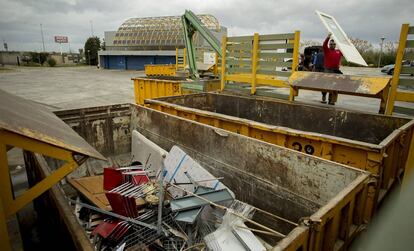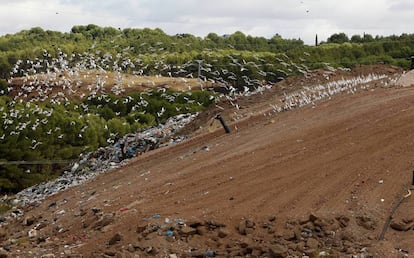Why Spain gets a failing grade when it comes to recycling
Only 29% of municipal waste currently gets recycled, far from the EU goals set for 2020


There are two speeds when it comes to recycling waste: one is the speed maintained by European institutions, who are now working to raise the targets for all EU members over the coming decade; and the other is the speed achieved by Spain, which seems unable to increase its municipal waste recycling rate to, at the very least, observe current EU regulations.
While 45% of municipal waste on average gets recycled in the EU, in Spain that figure remains stuck at 29%. And the remaining waste mostly ends up at a dump.
While 45% of municipal waste on average gets recycled in the EU, in Spain that figure remains stuck at 29%
The European Parliament¡¯s environment committee on Tuesday approved the new targets for the coming years, and the draft is expected to get the green light inside the chamber at a plenary session scheduled for April.
At that point, all EU members will have to recycle at least 55% of municipal waste by 2025, going up to 65% by the year 2035.
Recycling is one of the pillars of the so-called circular economy, which aims to turn one industry¡¯s by-products into another industry¡¯s raw materials. It is practically a matter of survival: with the current population growth forecasts, it will be impossible to keep up current consumption rates of raw materials.

According to the latest Eurostat figures, around 45% of municipal waste (which does not include industrial or hazardous waste) is getting recycled on average across the EU. The current directive establishes a 50% target for 2020, and the new targets for 2025 and 2035 will only require a one-point annual increase.
But in countries such as Spain, these figures sound like science fiction. ¡°It¡¯s impossible. It is materially impossible,¡± warns Carlos Arribas, of the green group Ecologistas en Acci¨®n, about the 50% target for 2020.
Germany, the top student
Germany is the unquestionable leader when it comes to recycling municipal waste, having already surpassed the 65% rate that¡¯s been set as a target for 2035. According to Eurostat data from 2016, Austria, Slovenia, The Netherlands and Belgium were also over 50%. That same year, France and Britain were recycling over 40% of their municipal waste.
The latest Eurostat data appears to prove him right. In 2016, the latest available year, Spain only recycled 29.7% of its municipal waste. But the worst part is that this figure has remained practically the same since 2010.
Sources at the Agriculture, Fisheries and Environment Ministry admit that ¡°measures must be adopted to increase recycling by 20 percentage points¡± in order to meet European standards. The ministry says it has drafted an action plan for a circular economy for the 2018-2020 period, although the draft has yet to be approved.
¡°If the actions included in it are launched, the target will be close to becoming a reality in Spain,¡± said the same source, who stopped short of venturing whether Spain will meet 2020 goals.
Regional differences
This year, the European Commission (EC) will draw up an ¡°early alert¡± report on progress being made by member states towards these 2020 targets. And Spain is set to be listed among countries at risk of failure. Last year, the EC included Spain in a group of eight member states who underwent a policy review and who were urged to increase their efforts.
In its analysis, the Commission underscored the significant differences in municipal waste recycling rates depending on the region. La Rioja, for instance, was well above 50% in 2013 already, whereas the Canary Islands, Madrid and Galicia were not even at 20%. European officials asked in their report for greater coordination between local, regional and national authorities.
The ministry notes that the state has powers over basic legislation and general planning, but that ¡°it is the regional and local authorities who have executive powers and control over waste management.¡±
English version by Susana Urra.
Tu suscripci¨®n se est¨¢ usando en otro dispositivo
?Quieres a?adir otro usuario a tu suscripci¨®n?
Si contin¨²as leyendo en este dispositivo, no se podr¨¢ leer en el otro.
FlechaTu suscripci¨®n se est¨¢ usando en otro dispositivo y solo puedes acceder a EL PA?S desde un dispositivo a la vez.
Si quieres compartir tu cuenta, cambia tu suscripci¨®n a la modalidad Premium, as¨ª podr¨¢s a?adir otro usuario. Cada uno acceder¨¢ con su propia cuenta de email, lo que os permitir¨¢ personalizar vuestra experiencia en EL PA?S.
?Tienes una suscripci¨®n de empresa? Accede aqu¨ª para contratar m¨¢s cuentas.
En el caso de no saber qui¨¦n est¨¢ usando tu cuenta, te recomendamos cambiar tu contrase?a aqu¨ª.
Si decides continuar compartiendo tu cuenta, este mensaje se mostrar¨¢ en tu dispositivo y en el de la otra persona que est¨¢ usando tu cuenta de forma indefinida, afectando a tu experiencia de lectura. Puedes consultar aqu¨ª los t¨¦rminos y condiciones de la suscripci¨®n digital.










































